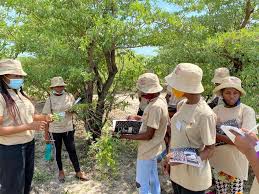Conservation camp in Botswana encourages young girls to care for the environment
A tourism company in Botswana kickstarted a project that aims to get more girls interested in STEM

By Keletso Thobega for The Midweek Sun in Botswana
Environmental conservation education should be added to the school curriculum and supported with greater investment, according to Okavango Wilderness Safaris .
Programme coordinator at Okavango Wilderness Safaris, Moalosi Lebekwe, lamented the fact that Environmental Science Education (ESE) is non-existent in Botswana due to several challenges, including a lack of resources and because training in the subject would need to be held outdoors.
Lebekwe said that taking care of the environment is not highly prioritised but is a critical aspect of development. Okavango Wilderness Safaris hosted a camp for 30 girls under its foundation, Children in the Wilderness – Botswana, at James Sausage Tree Camp in Etosha.
The camp was sponsored by the American Embassy to the tune of approximately £18,500 for a period of one year. The theme of the camp was ‘Conservation Science Camp for Girls in Rural Areas,’ and the participants, school girls from Ngambao Junior Secondary School in Seronga, were trained and equipped with skills in environmental conservation.
Lebekwe said that the project is geared towards encouraging girls in rural areas to pursue Science, Technology, Engineering, and Mathematics (STEM) related subjects and career trails.
“We noticed that many girls are struggling with certain subjects, particularly maths and science. One of the other reasons is that young girls are also deterred by other challenges in their lifestyle such as welfare challenges, for example,” he said.
Lebekwe explained that the aim of the camp was to motivate girls to branch into environmental and STEM-based tertiary degrees and career trajectories.
“The five-day camp gave girls exposure to various training in the fields of environment, science, and STEM facilitated by an all-women experienced team of ecologists and educators,” he said.
He further noted that in schools, the challenge with pursuing STEM subjects is that there is sometimes a lack of resources. He reiterated that there is a need to increase numbers in the fields of STEM.
“We wanted to start by testing grassroots and reaching out at junior schools, where they are at a phase where they will be deciding on their senior school subjects.”
Lebekwe said beyond that, they also wanted to bring together the girls in order to address issues related to their social and economic lives such as poverty and teenage pregnancy among others.
“We wanted to inspire them to improve and make choices that correlate with them having higher ideals for their lives,” he said. He noted that they focused on tourist-based areas because that is where the need for environmental protection is needed the most.
Lebekwe is passionate about including ESE in the schools’ curriculum because he not only appreciates its importance and relevance but also learned how integral it is to development when living overseas.
“I noticed that all Governments take environmental conservation seriously, and they determine the future of work”.
He said camps like this are aligned to the National Development Plan (NDP) 11 which speaks of the need to protect environmental resources, as well as Vision 2036, which advocates for sustainable and optimal use of our natural resources, with the hope that it will transform our economy and uplift people’s livelihoods.
This article is reproduced here as part of the African Conservation Journalism Programme, funded in Angola, Botswana, Mozambique, and Zimbabwe by USAID’s VukaNow: Activity. Implemented by the international conservation organization Space for Giants, it aims to expand the reach of conservation and environmental journalism in Africa, and bring more African voices into the international conservation debate. Read the original story here.
Join our commenting forum
Join thought-provoking conversations, follow other Independent readers and see their replies
Comments
Bookmark popover
Removed from bookmarks